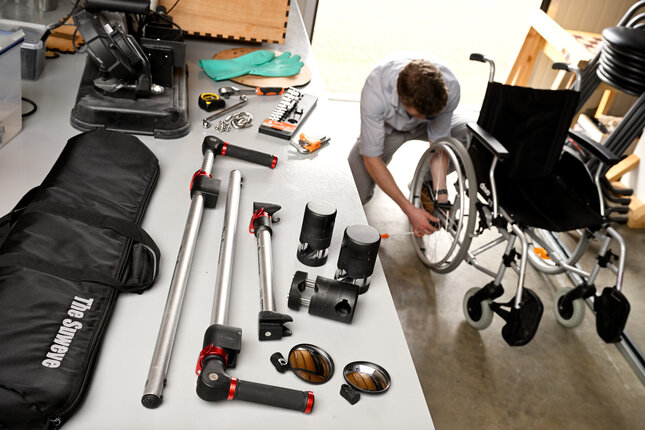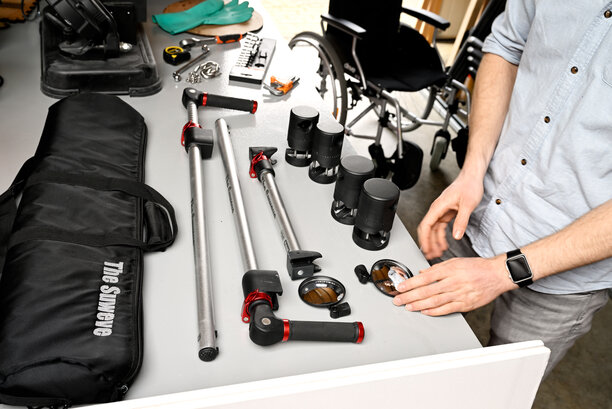'A startup is a really fun ride that I wish for every student'
Master's student Embedded Systems Wouter Witteman lives for inventing innovative solutions.
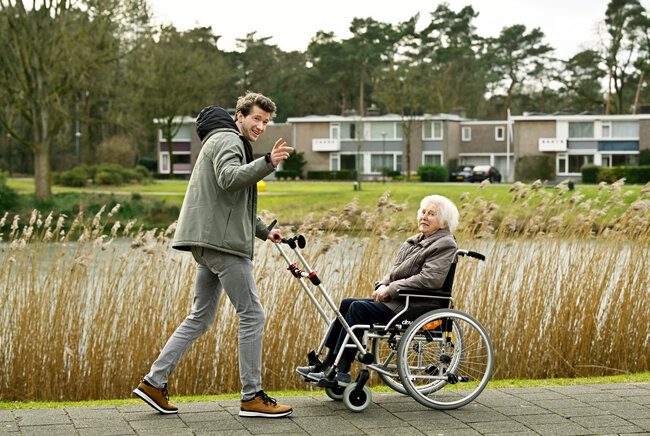
One of the first words Wouter Witteman (23) said as a child was ‘plug in’. With his curious and inquisitive mind, he likes to figure out how things work and can be improved. As such, the Embedded Systems master's student is always looking for innovative solutions. This is also how he began the startup SUWEVE, which has developed a wheelchair accessory that allows wheelchairs to face backwards when pushed, so that you can look at each other during a walk.
Problem solving is something Wouter does on a continuous basis, and as second nature. For example, while doing odd jobs in his workshop, when the resin from his 3D resin printer does not solidify properly (“It turned out to be too cold in the garage, so I made a central heating system for the resin bath”).
For his profile paper, he and a friend built a flashing light for racing bikes. For this he won several awards and made the newspaper and other media. For wheelchairs, he developed the Suweve (pronounced Suwiev) accessory, which allows you to push a wheelchair that faces backwards. That way you can look at each other while walking and have a conversation more easily. Whatever it is: Witteman sticks at the problem until he gets it fixed.
In the blood
“It’s in my blood to investigate and make new things,” says Wouter. His father researched crumple zones for cars in the Mechanical Engineering department at TU/e, and his grandfather was a professor in Twente in the field of lasers.
“My father is a gadget man, who likes to bring the latest gadgets in technology into the house. I did a lot of DIY with him and now do it myself. For example, I covered the roof of our garage in solar panels.”
“For a while I was obsessed with home automation, linking up everything you can automatically control in our house. Sometimes the TV would stop working for a while, much to my parents’ frustration.”
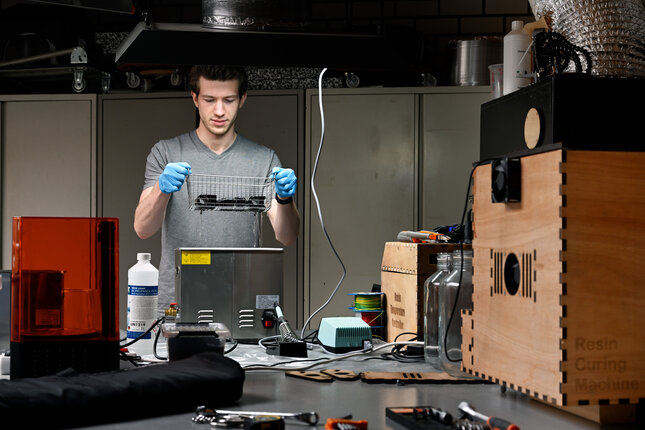
Thanks to all these little projects, you gain more and more confidence in your own abilities.
Wouter Witteman, master's student in Embedded Systems
"All my projects start off small and not serious. At my high school, the Van Maerlantlyceum, we had lockers with combination locks. It was dark in that hallway and it took a lot of effort for me to open my locker. Then I replaced the lock with an NFC tag reader and put a tag in my shoe. I was then able to open the locker with a karate kick,” he says with a smirk.
Life-size Pong game
For the Night of the Nerds, he developed a life-size Pong game; he created escape rooms for open days at his high school. “That's how you gain more and more confidence in your own ability,” he says.
On his phone, he keeps a list of inventions he wants to do more with someday. “If it works for me, I’m sure other people will be able to do something with it, too. But right now, I don’t have time to get started on all the ideas at once.”
The Suweve - how it began
The newspaper article about Wouter’s participation in the competition for the profile paper put him in the picture with Suzanne Laurey. She is a home care provider and had spent five years caring for an elderly woman in a wheelchair who had dementia.
“Her client could no longer talk, but non-verbally she could communicate well,” Wouter says. When Suzanne went for a walk with her in the wheelchair, that communication was impossible because she was standing behind when pushing her. “Sometimes the woman was crying, but Suzanne couldn’t tell until she came out from behind the wheelchair.”
Babies also lie facing you in the stroller, why don't we do that with wheelchairs?
Wouter Witteman, master's student in Embedded Systems
“So she asked me if I could make a prototype that would allow you to face backwards when being pushed in a wheelchair. It turned out there wasn’t one yet. And yet it’s not such a strange idea: after all, babies also lie facing you in the stroller, why don't we do that with wheelchairs? Especially for people with dementia, that could be a great solution.”
Facing backwards
That prototype arrived fairly quickly: three tubes that you attach to an existing wheelchair as an accessory. With two mirrors that allow the person sitting in the wheelchair to see what is happening behind them. “That was an important consideration: people do need to feel at ease with being pushed backwards,” he says.
They did a lot of testing with users for this. “Half of the occupants immediately felt comfortable being pushed backwards. Others felt a little uncomfortable for the first few minutes, looking over their shoulder to see whether things were all okay. But after a few minutes, you could see them relaxing and having fun, and more in-depth conversations were also taking place with the person pushing them forward. That motivated us tremendously.”
The name Suweve comes from the first names of the three initiators: Suzanne and her sister Eveline, and Wouter. The sisters have years of experience in healthcare. The team now consists of five people, which also includes TU/e Mechanical Engineering student Tom Huijben.
I fell in love with this problem and want to help solve it.
Wouter Witteman, master's student in Embedded Systems
It didn’t stop at designing the prototype. “I fell in love with this problem and want to help solve it. It could mean a lot to a certain group of people.”
They applied for a patent on their prototype, searched for money through grants and entered competitions, such as the TU/e Contest. “Through the TU/e Contest, we received guidance from The Gate, which helps startups. We have a business developer with whom we talk regularly. He helps us with patents, grant applications, but also with sessions where you learn, for example, how to do interviews with customers, to really get behind the question. It also provides me with a nice network of other startups and companies.”
Master's thesis
The prototype is now being produced with a run of 20 so that it can be tested by clients and their caregivers. “That is the litmus test for us. This should show whether the Suweve will really be used and whether people want to pay for it.” Wouter expects a Suweve to cost around two hundred euros.
Wouter’s weeks are brim full. Sometimes he is very busy with Suweve, sometimes there is room for study. “The nice thing about designing a product for healthcare is that it is not the fast market that tech products are. You often have to wait for other parties, as is the case now with producing the first twenty copies. That allows room for other things.”
Small team = doing everything
“I enjoy the theoretical aspects of studying, but I also get great satisfaction from being hands-on with Suweve and applying my knowledge and skills. Because we are such a small team, I am involved with all facets and have a say in everything.”
“I can therefore recommend beginning a startup to every student. It’s a fun and educational ride that I wish for every student. So if you have an idea, go to The Gate. They will help you find out whether your idea has potential, and in what way you can get to grips with it.”
Money is not a driver for me; I want to make an impact on the lives of others.
Wouter Witteman, master's student in Embedded Systems
Future
“I want to see how far we can get with the Suweve. Get pre-orders in, and convince investors for mass production, sell the product. I want to go through that trajectory, because that can teach me a lot.”
“It may turn out that there is not enough demand for the Suweve after all. But maybe there is a business case in it.” Getting rich is not his goal: “What I learn and the impact I can make on the lives of others with this is worth more to me than money.”
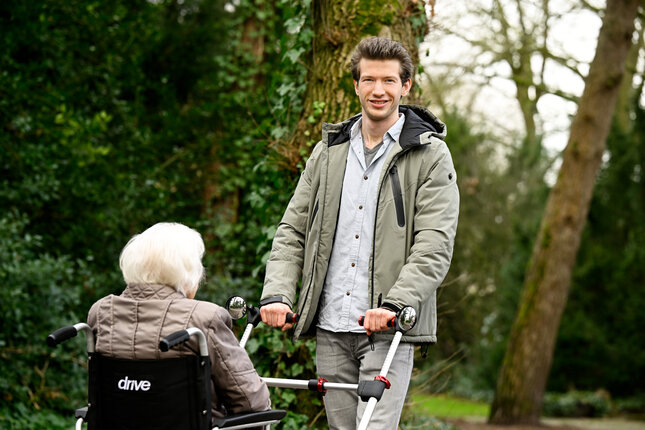
An outward-looking perspective
When Suweve starts running well, it will be time for Wouter to become more outward-looking. “It's not my intention to keep making wheelchair accessories all my life, nor do I need to run a company with healthcare products. That’s not where my ambition lies. I long for the challenge of a more advanced product, with electronics, something on the edge of what is feasible.”
Graduation
“In September I will start my graduation project. I want to do that in photonics, because I want to make the link with embedded systems and enable computers to compute using light. I’m looking for a fascinating project that interfaces with both areas.”
“After graduating, I want to work at a small technical company. That way I can get involved in more things than just engineering. I’m not the person to throw myself into one small electronic component. And, who knows, I might come up with something else with which I can begin a startup.” One thing is for certain: Wouter Witteman will never sit still.
More on our strategy
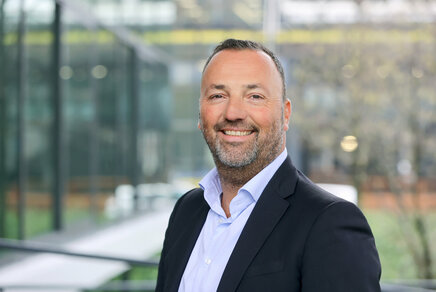

![[Translate to English:] [Translate to English:]](https://assets.w3.tue.nl/w/fileadmin/_processed_/c/f/csm_BvOF_2024_0319_AEV_license_TUe_Dirk_van_Meer_-_CORE_1__c976e259a5.jpg)
